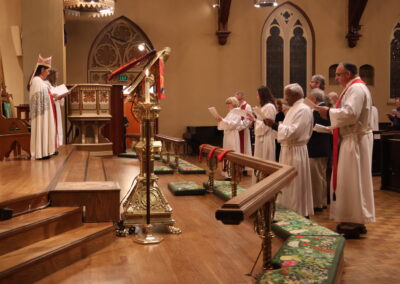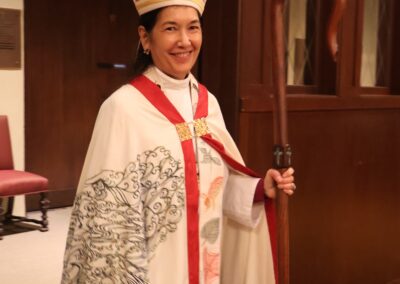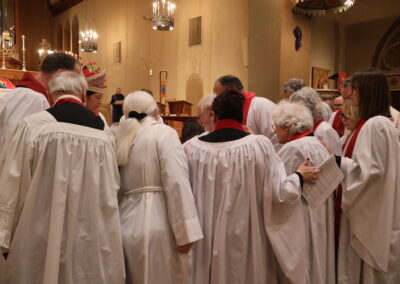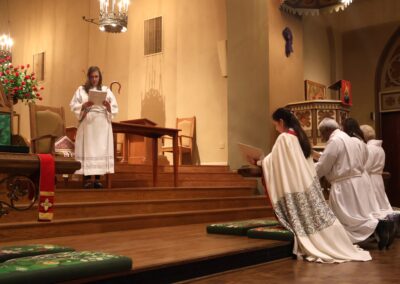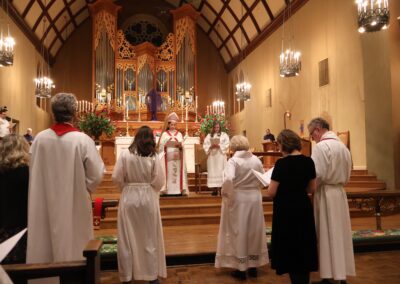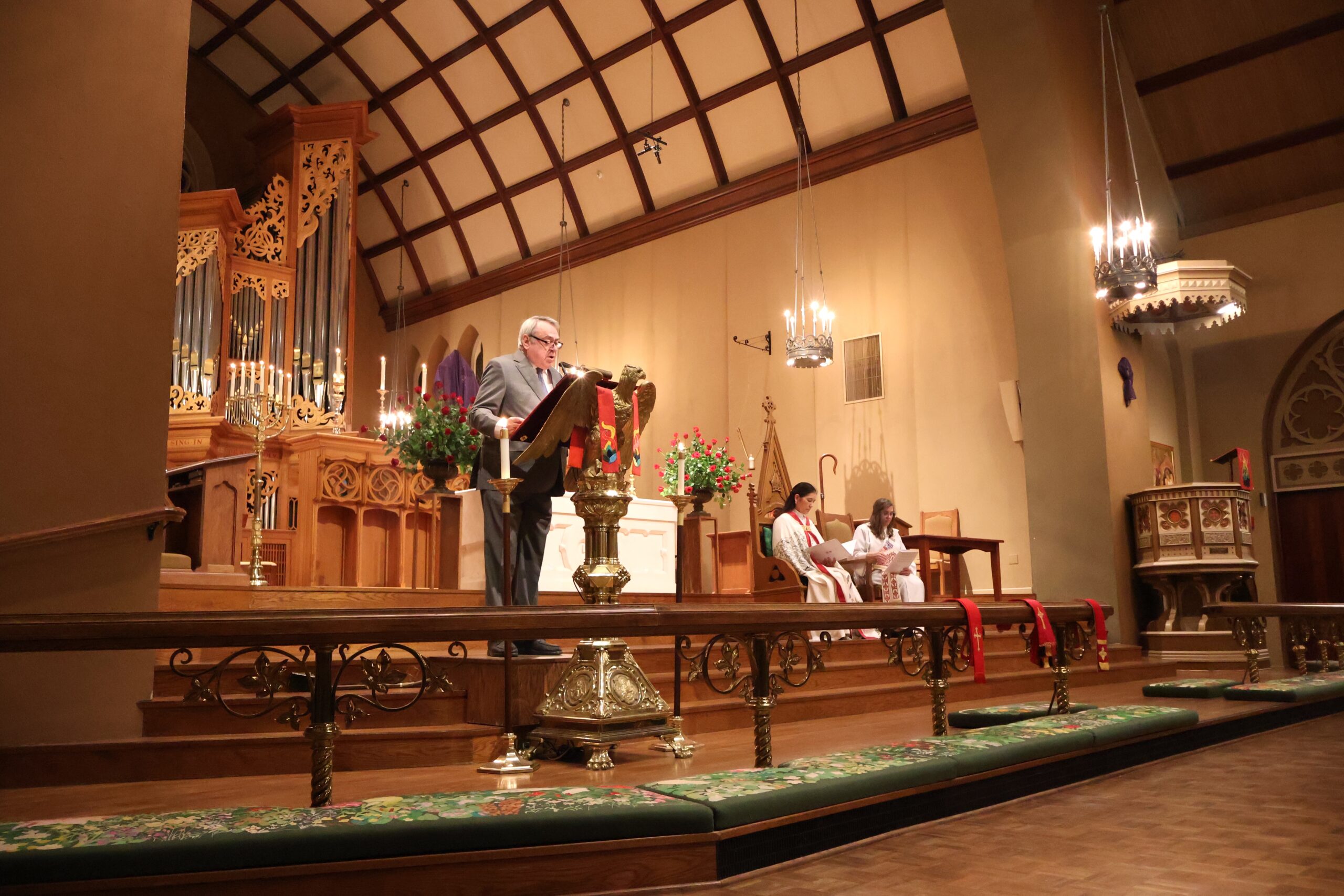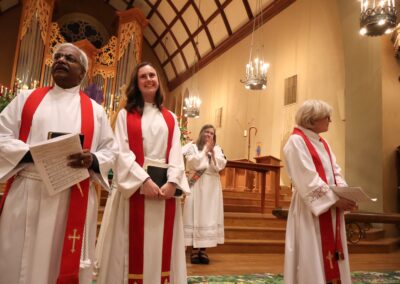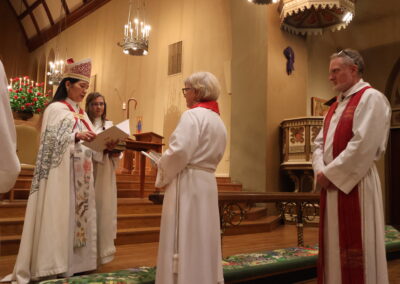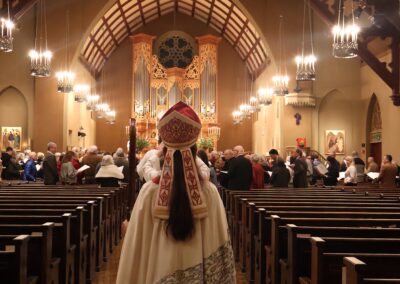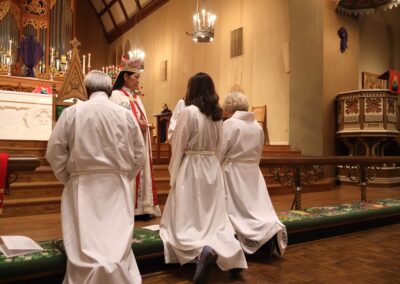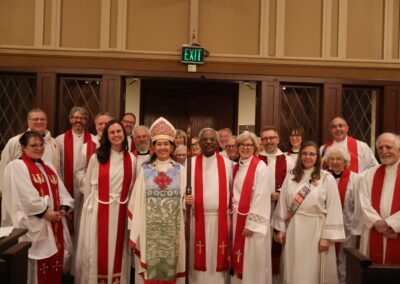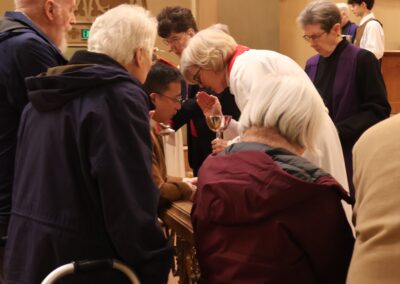Our February 2024 Ordination
A number of people have asked for the full text of the Bishop’s sermon for our February 2024 ordination; we’ve provided it here. Scroll down for photos and proceedings.
January 19, 2024 Trinity Episcopal Cathedral
Ordinations to the Priesthood Portland, OR
Isaiah 6:1-8
John 10-:11-18 The Rt. Rev. Diana D. Akiyama
Uncertainty is the current that runs through our lives these days. The quickly changing and unpredictable weather in times of climate change is, perhaps, one of the more concrete examples of uncertainty in our lives. But we are also uncertain about other things are well: safety and peace as wars rage, shelter for the growing number of people without a roof over their heads, food for the hungry, adequate care for the sick.
And perhaps even more troubling, uncertainty about the future of the church. As we face into the diminishing church and the uncertainty this stirs up, we might understandably ask: Who would want to serve in the church today? Who would want to be ordained into this?
We can begin exploring the answer to this question through the Prophet Isaiah. After confessing and receiving absolution, Isaiah responds to God’s call without equivocation, “Here am I! Send me.” But the people and place into which God is sending Isaiah is a mess. They have ears but do not hear. They have eyes but do not see. Isaiah is instructed to close their ears and eyes … to make them heavy of heart in order that they will understand their need for the power of God’s righteousness.
Isaiah accepts God’s call just as it seems it is too late for the people to confess and be reconciled. Things are so bad that the people are now facing God’s judgment – a reality of profound loss and a calling to account. We can almost hear God’s voice like a mother’s, expressing anger that comes from deep disappointment and the loving determination to set a child right, “What did you expect if you kept behaving like that?”
After Isaiah offers himself in service to God, God tells him that it is all going to be burned down. And it is. All that is left is a tree stump. At the end of this passage we read, “A holy seed is its stump.” The people have brought loss and destruction upon themselves but God continues to move them toward new life symbolized by the stump of a tree.
In his book, “The Hidden Life of Trees” Peter Wohlleben describes the mysterious underground interconnection of roots between trees in the forest. Aided by fungi, these root systems serve as support and sustenance between trees. A healthy tree that is cut down, leaving only a stump, is still alive. Depending on the tree and its underground support system with nearby trees, it will generate new shoots from that seemingly dead stump.
God did not send Isaiah on a meaningless call to a fully dead community; God sent Isaiah to be a messenger of God’s love and deep desire for the people to find a new and radically different kind of life. A life that sprouts up from what has been cut down … life that is generated out of interconnection, cooperation, mutual support and fed by the mysterious and invisible movement of the Holy Spirit – a source that connects the people of God.
Notice the order of things as Isaiah is discerning God’s call and then answers, “Here I am! Send me.” It is only after he responds to God’s call that God gives him the unsavory job of interpreting God’s judgment to the people. The heavy lift was not a brilliant plan of Isaiah’s design or will – it was God’s activity which Isaiah fulfilled through faithfulness. It makes sense that, in the fullness of his humanness, Isaiah had at least a few moments of wondering what the heck he had done by responding to God’s call. To continue living with a heart fat with selfish desires, ears pitched toward self-fulfilling prophecies, and eyes blind to the suffering of others would certainly have been easier and more comfortable.
The full picture of responding to God’s call is coming into focus for us through Isaiah.
By responding to God’s call, Isaiah did not receive a holy zap empowering him to resolve all challenges from a place of distance…as though upon a throne. If we imagine Isaiah in prayer as he discerned this call, do we see him puffing up his chest and pumping his fist saying “Send me!” or do we see him quiet and in prayer, in a posture of openness?
Saying “yes” to God’s call is not a promotion as though one is now elevated to sit at his right hand, nor is it an entitlement that is somehow owed to us. In saying “yes” we acknowledge the need to relinquish our hubris and put ourselves under God’s authority. Any fantasies we might have about being in full control are exposed for what they are: our resistance to see and hear what God is revealing.
Our God-given capacity to truly see and hear is brought into even sharper relief when Jesus describes himself as the “good shepherd” in our reading from John’s gospel. Although we do not hear the word “love” in this passage, it would be very difficult to understand his teaching without concluding that he loves us.
The “hireling” is simply a hired-hand – someone who can do the job of tending the sheep for pay. He has no other relationship with the sheep. In fact, we can assume that he gives no thought to the sheep once his work is done. If there is any kind of danger, the hireling runs away to save himself and leaves the sheep unprotected and vulnerable.
The Good Shepherd, on the other hand, is the One who has a relationship with the sheep. He cares for them as his “own.” He cares for them with such love that, were they to come under attack, he would lay down his life for them. “I know my own and my own know me, as the Father knows me and I know the Father.”
Jesus is emphasizing a kind of relationship in which we know him as intimately as he knows us. This spiritual intimacy mirrors that between Jesus and God. Jesus is the Shepherd. And we — all of us lay and ordained — are his sheep.
I grew up singing the Venite in Morning Prayer and have the verses from Psalm 95 hard-wired into my understanding of being among his sheep.
In particular, verses 6 & 7:
O come, let us worship and fall down and kneel before the Lord our Maker.
For he is the Lord our God, and we are the people of his pasture and the sheep of his hand.
The image of being held in God’s hand – under that kind of protection, guidance and love – ought to be a guiding image for us. The sense of being known so fully by God that we are loved beyond understanding is just one-half of the whole; the other half is our ability to know God. This was a concern in Jesus’ day, which is the reason he uses the sheep/shepherd metaphor to emphasize our vulnerability to pretenders and would-be Messiahs. He is the Shepherd who knows us. We are the Sheep of his hand – but how can we be assured that we know him?
The distinct ministry and call of a priest is to equip the people to know exactly who Jesus is – how to have eyes that truly see and ears that truly hear. Which is to say, how to see and hear in ways that allow us to follow Jesus. And if we are following Jesus, we can be assured that we are moving into relationship with God.
But ordination does not mean that we have super-powers to set about the work of discipleship. It does place upon the ordained a unique burden of submission and obedience under God. By submission, I mean we understand that our human agency is ultimately a response to God. By obedience, I mean that we seek to listen with our whole heart and mind to God’s call and then to follow. And all of this is in service to building up the church, the head of which is Christ.
The measure of success as a priest is not so much in numbers as it is in faithfulness. Indeed, faithfulness is at the heart of the work of a priest. To be faithful as a leader, one must be grounded in a prayer practice that is constant, fervent and unabashed.
Emily, SuEllen, and VJ, I trust that you have already begun to appreciate the importance of this practice in your ministry. I would add one bit of instruction as well:
Find a place and the time to kneel in your prayers. This posture has drifted out of our common worship and I believe, for those who are physically able, kneeling in prayer has a unique way of arresting the ego from its need to drive all things. I imagine Isaiah in a kneeling posture as he responded to God’s call.
You each have been called to serve God in this church at a time of great uncertainty. And much of these uncertain times are of our own making as the comfortable and powerful move ahead with dull ears and covered eyes. And the weak and vulnerable struggle to know who is, truly, the Good Shepherd? Who is the one who knows us as His own and will show us the way? How do we develop the eyes and ears to move toward this divine love and trust that, even if it is all burned down, there will remain a “stump that is the holy seed”?
This is the time you have been called into. You have been called to lead from a posture of prayer and faithfulness, to discern the kind of guidance, wisdom and courage needed to strengthen the church – God’s people.
The new shoots that will rise up from the stump are evidence of God’s mysterious life-giving movement. The Holy Spirit, like the roots of trees deep underground, moves and connects, restores and renews. Unseen, unheard, She moves as life itself. May the Holy Spirit stir up in you the power of God’s wisdom and love. And over the bright arc of your priesthood, may you cry out not once but countless times and from bended knee, “Here I am. Send me!”
Our ordination on February 16th, 2024 was attended by many.
Orders of Ordained Ministry:
-
- ORDER OF BISHOPS carry on the apostolic work of leading, supervising, and uniting the Church
- ORDER OF PRIESTS (PRESBYTERS), together with the bishops, priests take part in the governance of the Church, in the carrying out of its missionary and pastoral work, and in the preaching of the Word of God and administering his holy Sacraments
- ORDER OF DEACONS assist bishops and priests in all of this work. It is also a special responsibility of deacons to minister in Christ’s name to the poor, the sick, the suffering, and the helpless.In the course of fulfilling one’s baptismal vows, the nudge to discern for the Holy Order of the Diaconate or the Priesthood may be experienced by some.
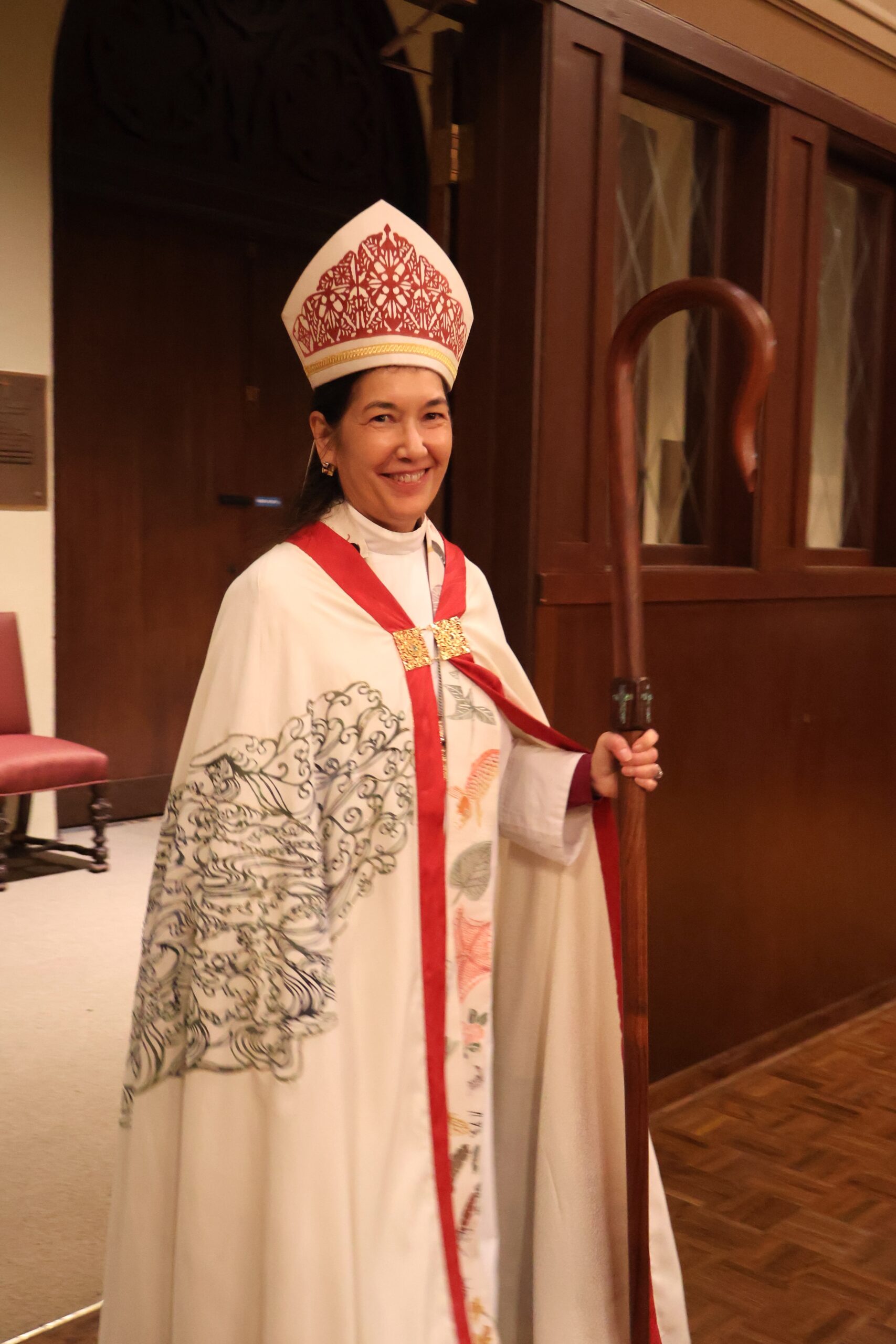
A period of discernment is essential as one seeks to hear through prayer, reflection, and spiritual guidance how God may be calling them to ordained ministry. The call to Holy Orders ought to be engaged with soberness, humility, and obedience. If you are feeling a call to ordained ministry, we invite you to explore that with your faith community’s clergy and learn more about the diocesan Discernment Communities. These communities are open to anyone exploring any call to ministry, ordained or lay.
For information about discerning a call to Holy Orders
Contact Derek Moyer, Missioner for Lifelong Formation at [email protected].

